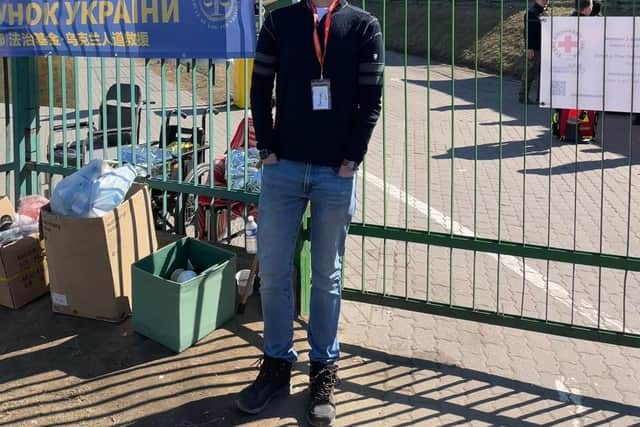Ukraine-Russia: Scots student given essay on Russian foreign policy, heads to Ukrainian border
Now, he is putting the finishing touches to his final first year essay on Russian foreign policy – less than a week after returning from the Polish-Ukrainian border, where he has been volunteering to help refugees fleeing Russian attacks on Ukraine.
"When they gave out the module booklet in January, the essay topic was something like “describe the reason for Russia's increasingly assertive foreign policy stance in the past 20 years”, he says. “When we talked about Ukraine and Russia in class before I before I went, it kind of felt like a concept, something further away. I didn’t know then how important that would be for me.”
Advertisement
Hide AdAdvertisement
Hide AdMr Bader, 19, who is studying International Relations at the Fife university, has returned to Scotland for a few days to finish his end-of-year essays and sit an exam - before heading back to Poland next week.


A few days after war broke out, he was contacted by a Polish friend who he knew from his native New York, who told him his family was travelling to the border at the village of Medyka, to volunteer to help the refugees pouring into Poland. The United Nations’ refugee arm, UNHCR, estimates that around two million refugees have fled to Poland since the war broke out in February.
He says: “They had everything set up and essentially texted me ‘Hey, do you want to tag along?’ and then 48 hours later, I was on a plane to Krakow.
"It was it was very surreal, partly because it really brought it home how close it was. It was a three hour flight, then I drove for two hours and I was on the Ukrainian border.”
He volunteered with two charities – food organisation World Central Kitchen and another NGO, Ukraine Take Shelter. One supplied suitcases to refugees who had been forced to flee their homes with almost nothing, while he also handed out thermal blankets in freezing conditions.
"Arriving at the border crossing, it doesn't really hit you, because it looks like something right out of the BBC, it looks like one of those five second clips they'd play before talking about a story. We got to the border crossing and we literally hopped a barbed wire fence to like, get into the place where all like the aid organisations had set up their tents and then we were just there working, right off the bat. There was no time to pause. We pulled up and the [other aid workers] were like, ‘Okay, grab the suitcases. We're going’.
“It's interesting, that the way it feels when you go through most of Poland, is that it seems so normal. You can definitely see the signs of it. But it really isn’t until you get to the border crossing itself, where there is that sense of maybe not chaos, but just that it’s hectic and there's there's really a surreal feeling in the air. It's not like they're these massive refugee camps set up, stretching for miles and miles. It felt at least relatively systematic. They have these big refugee centres set up in what are essentially shopping malls."
Like most students his age, Mr Bader had barely boiled an egg before – but learned fast. World Central Kitchen makes hot meals for refugees.
Advertisement
Hide AdAdvertisement
Hide Ad"I did a huge hodgepodge of things when I was there, essentially anything I could do,” he says. “Sometimes, it was a whole day of peeling potatoes for 12 hours, or stirring the hot chocolate.”
Many of the families entering Poland – some with young children or other vulnerable family members - had faced lengthy waits at the border crossing.
"Food is essential, because at that moment, they come over and they don't have anything,” he says “For these people, just hot food and fuel and just being able to sit down was definitely really important. It was a logistical challenge for us at the kitchen, we didn't know what we were going to be getting every day essentially - we had to work with whatever food and supplies that we got. It's not like there's a fully organised supply chain.”
He crossed the border daily to hand out supplies in a supermarket trolley, then queued with refugee families to help them transport their belongings into Poland using the trolley.
“We bought in bulk hundreds of suitcases from a small Polish warehouse right outside of town, and we loaded them into a van and we just we just handed them out,” he says. “A lot of people crossing the border essentially have nothing but grocery bags to hold their things, you literally see people crossing over carrying whatever they can carry in grocery bags. That’s one of the one of the things you definitely don't consider before you’re there. When you think of humanitarian aid, you think of obviously food, water and shelter, but there's so many other factors when it when it comes to making sure everyone ends up all right.
While in Poland, Mr Bader managed to call into a couple of lectures remotely.
“I had an essay due yesterday and one due today, then I have a test this week,” he says. “But I was literally working on the border on Tuesday morning and back in St Andrews by late afternoon. That was definitely the weirdest feeling to switch back off from that very intense, surreal place, back to Scotland, to St Andrews and be back in my dorm.”
A message from the Editor:
Thank you for reading this article. We're more reliant on your support than ever as the shift in consumer habits brought about by Coronavirus impacts our advertisers.
If you haven't already, please consider supporting our trusted, fact-checked journalism by taking out a digital subscription.
Comments
Want to join the conversation? Please or to comment on this article.
